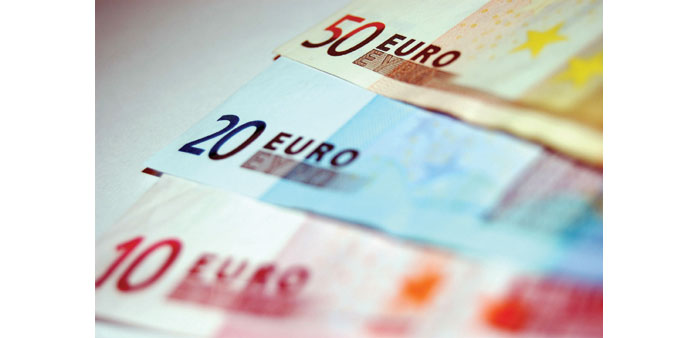The euro yesterday dropped to $1.1140 from $1.1159 late in New York on Wednesday.
AFP/London
Europe’s main stock markets closed mixed yesterday, rebounding slightly from recent heavy losses linked to China’s weakening of its currency and awaiting a Greek parliament vote on terms for a third bailout.
London’s benchmark FTSE 100 index ended the day down a slight 0.04% at 6,568.33 points.
In the eurozone, Frankfurt’s DAX 30 rose 0.82% to 11,014.63 points, while the CAC 40 in Paris gained 1.25% to end at 4,986.85.
The euro dropped to $1.1140 from $1.1159 late in New York on Wednesday.
“So fears of Chinese economic meltdown appear to have been allayed for the time being, evident in a broad stock market rally,” said Augustin Eden, research analyst at Accendo Markets.
Europe’s main indices had slumped over the past two days, with Frankfurt and Paris both shedding more than 3% on Wednesday.
China weakened its currency for the third consecutive day yesterday, but financial markets that had been shaken by the earlier surprise devaluation took heart as authorities pledged not to let the yuan plummet.
The central bank trimmed the reference rate for the yuan—also known as the renminbi—by 1.11% to 6.4010 yuan against the dollar, the China Foreign Exchange Trade System said, from the previous day’s 6.3306.
Analysts have viewed the action as a way for China to both boost exports by making its goods cheaper abroad and push economic reforms.
It comes after recent economic data out of China has reinforced concerns that growth is slowing in the world’s second largest economy.
The reassuring tones from Beijing sent most Asian markets to higher closes yesterday, with Tokyo up 0.99%, Sydney rising 0.11%, and Hong Kong 0.43% ahead.
Elsewhere yesterday, Athens’ main stocks index closed down 0.69% at 686.65 points even as official data showed Greece’s economy expanded by 0.8% in the second quarter of 2015. Analysts had expected a 0.5% contraction.
According to the new figures, the Greek economy posted zero growth in the first quarter of the year after having contracted 0.2% in the last quarter of 2014 - thus averting two periods of decline that would constitute a recession.
The figures showed second quarter growth up 1.4% compared with the same period the previous year.
“Greece’s GDP figures for Q2 brought some rare good news, but they relate to an entirely different economy than the one currently being strangled by capital controls,” said economist Jonathan Loynes at research firm Capital Economics.
“But the figures do not change our view that the economic assumptions built into the bailout plan are likely to prove far too optimistic,” he said.
The data comes as Greek lawmakers held an emergency parliament session yesterday for a crucial vote on ratifying a hurriedly concluded bailout deal, but Germany—Europe’s de facto paymaster—has cast doubt on the agreement.
Greece and its creditors are under pressure to finalise the €85bn ($94.8bn) deal by August 20 when Athens must repay some €3.4bn to the European Central Bank.
In New York, Wall Street stocks wobbled yesterday after US data showed a solid gain in retail sales and a modest uptick in jobless claims.
After earlier falling US shares rallied around mid-day in New York, with the Dow Jones Industrial Average up 0.16% at 17,431.14 points.
The broad-based S&P 500 edged up 0.05% to 2,087.01 points, while the tech-rich Nasdaq Composite Index gained 0.20% to 5,054.35.
“This market continues to find difficulty in knowing what to think with so many mixed-up signals from the economic data, central banks, earnings, and the market behaviour itself,” said Briefing.com analyst Patrick O’Hare.
Overall US retail sales rose 0.6% in July from June to $446.5bn, a slightly bigger increase than the 0.5% gain projected by analysts, according to the Commerce Department.
The US Department of Labor reported that jobless claims rose by 5,000 to 274,000 in the week ending August 13.

